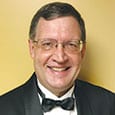It is surprising to learn that supposedly extroverted people can actually be shy. The list includes historical figures like Abraham Lincoln and Eleanor Roosevelt, actors, entertainers, and musicians, including Meryl Streep, Johnny Carson, and Elton John. It is easy to assume that all conductors are extroverts, and most probably fit this description. The celebrated and revered Bernard Haitink, principal conductor of the Chicago Symphony from 2006 – 2010 is a rare exception. Other famous conductors, while not necessarily shy, have admitted to having experiences with ongoing stage fright, including Leonard Bernstein, Arturo Toscanini, and Sir Georg Solti.
In teaching basic conducting, I would invariably have students who appeared introverted or anxious, and it took some extra effort for them to stand on the podium and lead the class or ensemble through an assigned piece. The following are traits, based on my own experience and observations, that I believe are essential to succeeding as a conductor and will help introverts and those experiencing anxiety or stage fright overcome these feelings.
Performance Skills
All would-be conductors must develop basic performance skills including:
• Command of a major instrument as a soloist and chamber music performer
• The ability to make interpretive decisions resulting in performances that evoke emotional responses in an ensemble and audiences alike
• Perceptive aural skills to deal with intonation, balance, and transposition matters.
In addition, knowledge of musical form is essential not only to develop learning goals, objectives, and strategies, but also to establish a meaningful and artistic interpretation of music to be performed.
Fundamentals
Baton technique should be sufficient to visually maintain tempo and continuity of rhythm, line, and musical detail. Rehearsal technique must include the recognition of many problematic issues to make that time productive. In the end, a conductor’s body language is as important as any of the other skills listed so far. The ability to communicate with students in rehearsal must be educational, helpful, and produce positive results.
Essentials
With these fundamentals and just two more essentials, a less than outgoing person can be an effective conductor. These include passion and self-confidence. The need (not want) to make music, must be a driving force. The personal discovery that making music is what you were meant to do has to be a substantial part of your makeup. The ability to physically display self-confidence and overcome anxiety, even during times when you feel anything but, can be the most effective way to cope. That takes remaining in character, not only to relax yourself, but to display that impression to an ensemble or an audience. Stand tall, be organized, speak clearly, and focus on solutions. Shyness, stage fright, and anxiety can only be detected if exhibited.
The range of leadership styles can differ greatly from autocratic, to business-like, to genial. The most important and fundamental trait is genuine sincerity. Some conductors talk too much, others perhaps not enough or without saying a word. Nonetheless, leadership reveals itself in achieving the best possible musical results one is after. Early on, young conductors mistakenly try to emulate or become someone else such as a former teacher or famous conductor. That never works. I often told my students that it would take at least five years for them to discover their own unique classroom personality and teaching style. Simply be yourself.
Many years ago, Francis McBeth closed a Midwest Clinic session by saying that a conductor must know three things, “Know yourself. Know your stuff. And know who you’re stuffin.” In other words, be prepared by thoroughly knowing yourself, the score and what you want to accomplish, and your group. Anything else will take care of itself. These are wise words, indeed.
A Confession
The subject of being a shy conductor is personal because that also describes me. I am anything but an extrovert, but when it comes to conducting, I become an “extroverted introvert.” Throughout my career, I have always felt nervous or keyed-up before any class, rehearsal, or performance. Over time, I believe that feeling helped make me focused, on my game, and effective. For any musician, the experiences of life, learning about oneself, and growing in confidence, security, and knowledge, all can make the difference in overcoming shyness, anxiety, and stage fright.
Food for Thought
A conductor is often the central character in making music. Music can take performers and listeners into other worlds, magical worlds that offer hope, joy, comfort, and more through a means of expression that goes beyond what words can convey. Knowing this can only confirm that taking the steps to overcome any doubts or fears in assuming the role of conductor will be gratifying for you and those you touch. What remains now is to take a breath, go through with it, and carry on.






